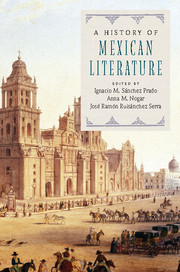Book contents
- Frontmatter
- Contents
- List of contributors
- Introduction
- PART I COLONIAL LITERATURE
- 1 The Languages and Literatures of Early Print Culture in the Colonia
- 2 A Chronicon of Crónicas: The New Spanish Prose Narrative
- 3 Theatricality and the Public Enactment of the Mexican Colonial
- 4 Sor Juana Inés de la Cruz: The Tenth Muse and the Difficult Freedom to Be
- 5 Jesuit Enlightenment: Interventions in Christianity and Intellectualism
- 6 Women in the Print Culture of New Spain
- 7 The Colonial Literary Scope: Empire, Letter, and Power
- 8 New Spain's Archival Past and Present Materiality
- PART II THE NINETEENTH CENTURY
- PART III TWENTIETH AND TWENTY-FIRST CENTURIES
- PART IV MEXICAN LITERATURE BEYOND BOUNDARIES
- Index
- References
2 - A Chronicon of Crónicas: The New Spanish Prose Narrative
from PART I - COLONIAL LITERATURE
Published online by Cambridge University Press: 05 July 2016
- Frontmatter
- Contents
- List of contributors
- Introduction
- PART I COLONIAL LITERATURE
- 1 The Languages and Literatures of Early Print Culture in the Colonia
- 2 A Chronicon of Crónicas: The New Spanish Prose Narrative
- 3 Theatricality and the Public Enactment of the Mexican Colonial
- 4 Sor Juana Inés de la Cruz: The Tenth Muse and the Difficult Freedom to Be
- 5 Jesuit Enlightenment: Interventions in Christianity and Intellectualism
- 6 Women in the Print Culture of New Spain
- 7 The Colonial Literary Scope: Empire, Letter, and Power
- 8 New Spain's Archival Past and Present Materiality
- PART II THE NINETEENTH CENTURY
- PART III TWENTIETH AND TWENTY-FIRST CENTURIES
- PART IV MEXICAN LITERATURE BEYOND BOUNDARIES
- Index
- References
Summary
The arrival of Hernán Cortés (1485–1547) to the shores of the Yucatán in 1519 was followed by a burst of histories, travel accounts, and epistolary exchanges on Spain's expansion abroad and individual contributions to the imperial mission. This historiographical corpus, celebrating the establishment of New Spain as the first Spanish viceroyalty in the Americas, shaped a long-lasting Eurocentric imaginary of a “people without history” (Wolf, 1982). Yet this corpus was complicated by the appearance of ecclesiastical and mestizo chronicles that recovered and produced layers of documents for a colonial archive that for us today reveals as much as it conceals about the people of Mexico and the conflicted process of hispanization.
The idea of Mexico as a culturally diverse nation with a rich preconquest history has been inspired by the content and literary history of these colonial discourses. Traditionally, the crónicas de Indias (chronicles of the Indies) include narratives of exploration, conquest, and colonization. Yet the revision of the canon has brought to the forefront other colonial discourses that provide rich raw material for the critical examination of coloniality and its “civilizing” measures, imperial expansion, and the transformation of First Peoples societies and their territories. In Mexico, the crónica's most notable distinction is the hybrid nature of its archive and the dialogic forces shaping it.
Influenced by deep-seated European conventions of reading and writing, imperial chronicles attempted to exclude indigenous experience and history. However, the call for a reexamination of the colonial archive and its constituting documents has focused on the complexity of cultural practices involved in history making, as well as anxieties involved in the articulation of political power and authority – or its contestation. New questions regarding character, contexts, and intentionality underscore the contingent nature, value, and political complicity of the diffuse genre of the crónicas de Indias. Historians (and literary and cultural scholars implementing new interdisciplinary and theoretical paradigms) have demonstrated over the course of the past twenty years that the learned hidalgos, colonial bureaucrats, and religious historians who produced these texts were not alone in responding to personal, political, and ecclesiastical demands or agendas. Indigenous communities participated in intricate negotiations of colonial power.
- Type
- Chapter
- Information
- A History of Mexican Literature , pp. 33 - 52Publisher: Cambridge University PressPrint publication year: 2016



